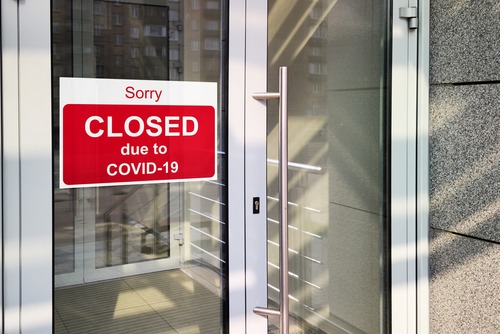
Pennsylvania Auditor General Timothy DeFoor on Sept. 14 released a performance audit criticizing the Wolf administration’s waiver process for businesses that asked to remain open during the start of the COVID-19 pandemic, saying it should be reformed before it’s used again in the future.
“I hope that a clear and concise process can be developed in case anything, god forbid, like this ever happens again,” DeFoor told Pennsylvania Business Report on Tuesday. “There were just a lot of inconsistencies regarding the entire process.”
The audit found that the waiver process provided inconsistent answers to business owners who sought to stay open, it was applied too quickly, and it should be reformed.
“This audit revealed a flawed process that provided inconsistent answers to business owners and caused confusion,” DeFoor said during a press conference in Harrisburg, Pa. “While the pandemic certainly presented some unique challenges, the process was hastily assembled on the fly and unevenly administered. This process should be reformed before anything like it is ever used again.”
Gov. Tom Wolf on March 19, 2020 ordered Pennsylvania businesses that were not categorized as “life-sustaining” businesses to shut down in order to help slow the spread of the coronavirus, which causes COVID-19. Businesses could request to remain open by applying for a waiver from the state Department of Community and Economic Development (DCED).
However, numerous business owners, stakeholder groups and legislators complained that the waiver process lacked transparency, moved too slowly and provided inconsistent or changing answers — all reasons for prompting the state audit, which DeFoor said “specifically focused on how the waiver process was developed and run.”
“Our goal is to make sure that the state provides a playing field that is as level as possible, recognizing that businesses are critical to Pennsylvania’s economic health,” he said.
The audit report contains five findings and makes 22 recommendations, such as giving more stakeholders a voice in developing industry guidelines, greater accountability and transparency in the decision making process and limiting the number of changes to the process while the program is in operation.
Finding 1, for example, is that the business closure order was more restrictive than federal guidelines issued by the U.S. Department of Homeland Security’s Cybersecurity and Infrastructure Agency (CISA) and resulted in more business closings.
“We certainly acknowledge we were in uncharted territory in March of 2020 while seeking to stem the spread of the COVID virus,” Gene Barr, president and CEO of the Pennsylvania Chamber of Business and Industry, told Pennsylvania Business Report. “However, had we adhered to CISA, we would have suffered fewer economic disruptions and job dislocations.”
The audit makes four recommendations related to Finding 1, including that the governor’s office “should re-evaluate its process for determination of life-sustaining and non-life-sustaining industry groups, in consultation with the federal government, the General Assembly, other state agencies, and stakeholder groups.”
DeFoor said in an interview that stakeholder groups in particular — like the Pennsylvania Chamber and the Pennsylvania Manufacturers’ Association, for instance — could help update the waiver process, depending on how the DCED configures a reformed process. He also said the governor’s office and the state health department also should be among those involved in such work.
“To be perfectly honest,” he said, “it starts with the legislature.”
Another problem outlined in Finding 2 of the audit report is that the guidance available to businesses and used by DCED to determine whether businesses are life-sustaining continued to evolve throughout the waiver program.
From the beginning of the business shutdowns, DeFoor pointed out that many businesses were confused about whether they were classified as life-sustaining under the state’s official guidance. In fact, about one-third of the 42,380 total waiver applications submitted to DCED were found to come from businesses that were notified that a waiver was not even required for them to remain in operation, according to the audit report.
DeFoor also said that the Wolf administration’s guidance for determining whether a business was life-sustaining, first issued on March 19, 2020, subsequently changed nine more times between March 21 and May 28, 2020, while a “frequently-asked questions” document intended to guide businesses was revised 14 times.
“While these changes were somewhat understandable in light of the evolving circumstances, they certainly contributed to the confusion felt by the business community,” DeFoor said.
Regarding allegations that some of Wolf’s waiver requests were political, DeFoor said that such information was not part of the audit report’s scope.
“The only thing that we looked at… was some of the undue influence from outside organizations,” he said. “For example, if somebody wanted an answer to a question and they didn’t get an answer within the period of time that they wanted, they would use either their lobbyists or the state legislature to get them an answer more quickly. Not everybody had that ability or that option,” which consequently made for an unlevel playing field.
DeFoor said that he hopes the audit isn’t considered political. He thinks it’s a bipartisan report. “Keep in mind,” he told Pennsylvania Business Report, “my predecessor was a Democrat; I’m a Republican. We didn’t set out in another direction because of the different party affiliations. We focused on the task at hand.”
The auditor general also reiterated that stance during the press conference.
“Let me state up front: I am not here to make this audit a political issue,” DeFoor said. “This pandemic has affected almost all of us personally and professionally and we are still dealing with a serious public health issue.
“The audit report represents a way for Pennsylvania to do a better job should we be faced with such a serious challenge again,” he said.
The full audit report is available at: https://www.paauditor.gov/Media/Default/Reports/DCEDAuditReport091421.pdf